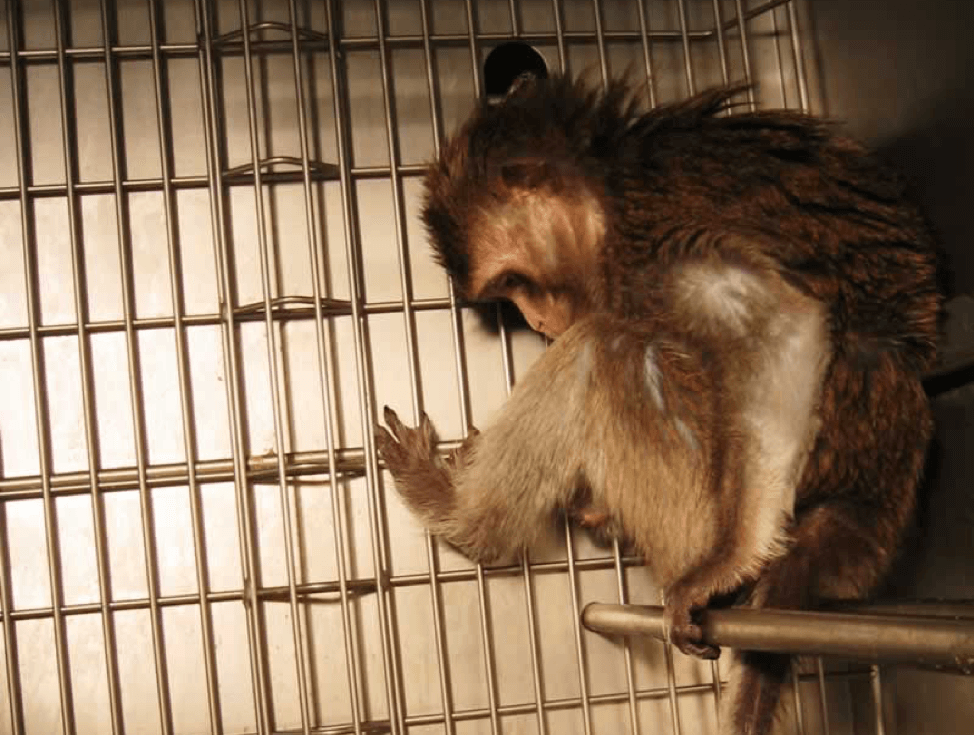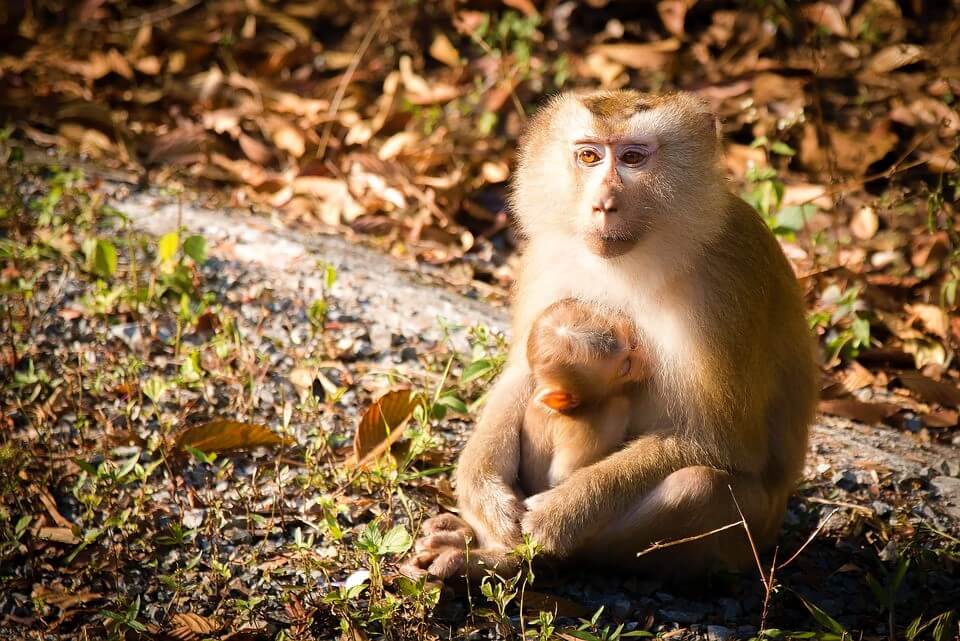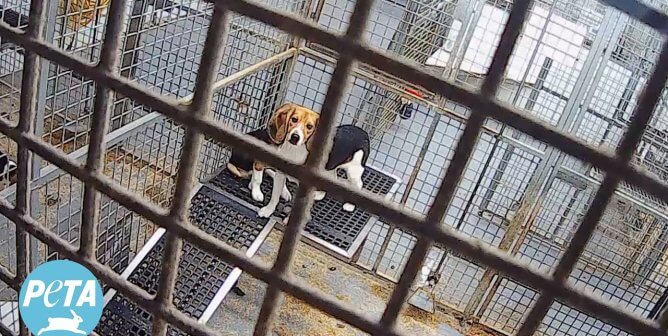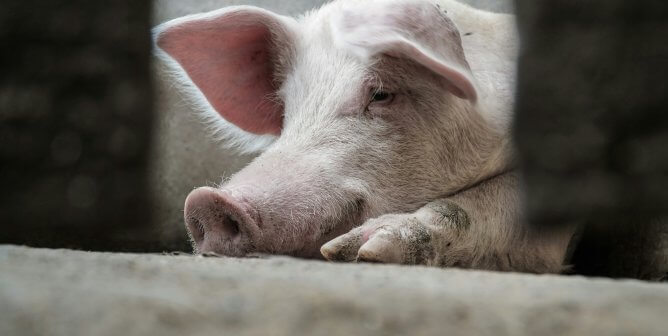For 60 years, the Washington National Primate Research Center (WaNPRC) has exploited monkeys in traumatic, painful, and irrelevant experiments supported by the University of Washington (UW).
The laboratory, which is one of the remaining seven National Primate Research Centers (NPRCs), has been a longtime PETA target for its horrific “nursery-rearing” experiments.
I Witnessed the WaNPRC’s Cruelty Firsthand
For decades, I have studied how diseases move between and affect monkey and human populations. In 2002, my work led me to the WaNPRC, where I worked as a primate scientist for 14 years and then served for nearly two years on UW’s Institutional Animal Care and Use Committee (IACUC)—the committee charged with ensuring compliance with minimum animal welfare standards in the university’s laboratories.
In both of these roles, I had a front-row seat to the dysfunction that plagues the WaNPRC. I found out that the center is a broken institution that fails at its most basic functions. It has no moral compass, is run ineptly, and unconscionably perpetuates the futility of primate experimentation at a time when alternatives to animal experimentation are available and when the need for ethical and reliable science has never been greater.
During my tenure, I saw tuberculosis, uncontrolled staph infections, and chronic diarrhea ravage the monkeys, destroying their bodies and making experimental findings even more unreliable than they already were.
The IACUC—which lacked any ethicists and was instead dominated by institutional employees and community members whose livelihoods are linked to experimenting on animals—gave experimenters carte blanche.
Veterinary and research staff were approved to do the following:
- Restrain monkeys in dark booths for up to 10 hours a day
- Repeatedly implant devices in monkeys’ skulls, eyes, hands, and limbs
- Separate mother monkeys from their babies, which is severely distressing for the highly social, emotionally intelligent animals
- Cage monkeys alone
- Subject monkeys to intensive testing (One protocol allowed investigators to collect 62 pinch biopsies of the gut twice monthly, take lymph node biopsies, collect bone marrow, and draw blood.)
- Experiment on a rarely used and endangered species, the pig-tailed macaque
Throughout my tenure as an IACUC member, I was consistently rebuked by the leadership of UW’s animal use program when I attempted to raise questions about aspects of animal use protocols. My concerns about study design, appropriate selection of animals, screening of animals for possible undetected co-infection, number and frequency of sample collections requiring sedation, and other issues were repeatedly shot down—even though these issues could have affected the results of the experiments that were being performed.
Can an Animal Welfare Advocate “Work Within the System” to Change It?
I have lived and worked in the countries that supply the macaques used at the WaNPRC. I have followed and studied macaques in nearly every environment that they inhabit: through the swamps of Borneo, along the streets of Singapore, and around temples and villages throughout Asia. I have been inside overseas monkey-breeding facilities, where I heard the monkeys’ cries of distress, smelled their fear and disease, and witnessed how utterly broken they had become in cages.

By working within the primate biomedical system, I thought I would be able to inform staff and researchers about the needs of captive macaques in order to maintain some semblance of their natural lives. I was convinced that if I could improve the husbandry and experimental conditions, it would result in improved animal welfare, which would lead to better scientific outcomes. But I was wrong.
Neither the laboratory nor the IACUC wanted to change. Regulatory box-checking triumphed over best practices. It was immediately clear that the UW’s IACUC did not want a primatologist advocating for macaque welfare. I was not an animal activist when I was seated on the IACUC, but after witnessing the utter contempt for animal well-being and the consequences that this disregard has for science, I knew that my work on the inside was done.

Macaques are extraordinary monkeys whose ecological, behavioral, and immunological adaptability helps them thrive in all kinds of environments. But a macaque in the cramped and impoverished environment of a laboratory cage is nothing like highly social, adaptable, clever, and beautiful monkeys in their natural habitats, whom I knew so well. At the WaNPRC, the notion that monkeys are expendable widgets in a machine whose suffering doesn’t matter reigns supreme.
The WaNPRC Is Failing Everyone, Including the Public
The facility is currently failing in a number of critical areas:
- The WaNPRC conducts poor and increasingly misleading and irrelevant experiments. Unintended infections are common at the center, including methicillin-resistant Staphylococcus aureus (MRSA), valley fever, tuberculosis, and others. The stress of captivity, loneliness, and despair wreak havoc on the monkeys’ immune systems, distorting already questionable experiments. Inadequate screening and surveillance for chronic or unrecognized infections compromise the research even further (for example, in vaccine and drug trials).
- UW fails at animal welfare. The WaNPRC has a history of gruesome violations of the federal Animal Welfare Act (AWA), as staff and investigators consistently fail to follow even the most basic federally mandated requirements. Monkeys have died of strangulation, starvation, dehydration, veterinary error, and choking on their own vomit. The WaNPRC is currently under investigation by the USDA for alleged failure to report violations of the AWA and by the Washington State Department of Agriculture for apparent violations of state regulations that govern the importation of animals and the requirement to notify government officials about the presence of diseases in the colony.
- UW’s animal experimentation oversight committee (the IACUC) is rife with conflicts of interest that compromise animal welfare and scientific integrity. The IACUC’s oversight functions have been co-opted and circumvented. UW has refused to allow animal ethicists to serve on the IACUC and even seated as the “community” representative the executive director of the Northwest Association of Biomedical Research (NWABR), a pro-animal experimentation organization that counts UW as a Platinum Member. NWABR explicitly states on its website that one of the benefits of membership is assistance with “recruiting and placing community members on ethics review boards for animal and human research.” Multiple members of the UW IACUC also serve on the board of NWABR.
- The WaNPRC is in freefall. Over the past decade, multiple WaNPRC directors have come under scrutiny and faced disciplinary action following charges of sexual harassment, financial mismanagement, and failure to ensure animal welfare. The moral and intellectual bankruptcy have affected animal care and staff morale and have jeopardized scientific integrity and productivity.
No Monkey Should Have to Endure Cruel Experiments—It’s Time to Shut Down the WaNPRC
In 2013, Harvard University’s New England National Primate Research Center faced a similar crisis. Harvard’s leadership looked at the multiple animal welfare violations, the problems with keeping monkeys in laboratories, and the future of research priorities and decided to close the primate center. This was the right course of action, and UW should follow suit by closing the WaNPRC.
Join tens of thousands of PETA supporters calling for the immediate closure of the WaNPRC and the release of the monkeys to appropriate sanctuaries so that they can live out their lives with the safety and dignity that they deserve.
Primatologist Lisa Jones-Engel, Ph.D., is a Fulbright scholar who has studied the human-primate interface for 36 years. Her scientific career has spanned the field, the research laboratory, and the undergraduate classroom. Dr. Jones-Engel serves as senior science adviser on primate experimentation with PETA’s Laboratory Investigations Department.





